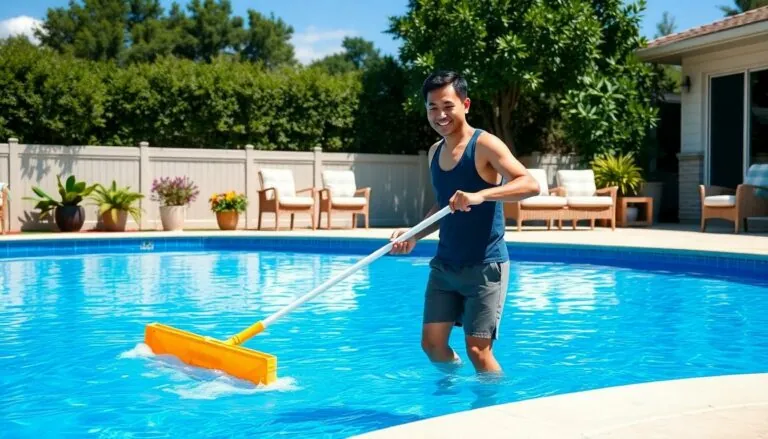Table of Contents
ToggleOwning a swimming pool is like having a personal oasis right in your backyard. But let’s be real—without proper maintenance, that sparkling blue paradise can quickly turn into a murky swamp that even the bravest of frogs wouldn’t dare to enter. Nobody wants to be the neighbor with the “water feature” that resembles a science experiment gone wrong!
Importance of Maintenance of Swimming Pool
Maintaining a swimming pool is crucial for enjoyment and safety. Regular upkeep prevents issues and ensures a clean environment.
Health Benefits
Healthy swimming environments require consistent maintenance. Clean water reduces the risk of infections and irritations for swimmers. Proper chemical balance kills harmful bacteria and algae. With regular testing of pH levels, issues can be identified before they escalate. A well-maintained pool promotes physical activity, encouraging swimming as an enjoyable exercise. Families can enjoy peace of mind, knowing the water is safe for their loved ones.
Aesthetic Appeal
An appealing pool enhances the overall look of a home. Regular cleaning keeps water clear and inviting, attracting family and friends. Overgrown vegetation or debris can detract from its beauty. Routine maintenance ensures pristine tiles and attractive pool features. Freshly maintained areas around the pool improve its surroundings, creating a welcoming atmosphere. A visually appealing swimming pool reflects the homeowner’s attention to detail and enhances property value.
Key Components of Swimming Pool Maintenance

Maintaining a swimming pool involves several key components that ensure water quality and equipment functionality.
Cleaning and Skimming
Cleaning and skimming play vital roles in pool upkeep. Removing debris such as leaves and twigs prevents buildup that can impact water clarity. Regularly skimming the surface keeps water looking inviting. Brushes and vacuums help eliminate dirt and algae from surfaces and floors. Schedule weekly cleanings to ensure optimal results. Using a net helps catch floating debris quickly. When leaves decay, they can affect water quality. Clean filters monthly to maximize efficiency and preserve pool health.
Chemical Balancing
Chemical balancing is essential for safe swimming conditions. Testing the water regularly ensures pH levels remain between 7.2 and 7.8. Chlorine levels should range from 1 to 3 parts per million for effective sanitization. Adding algaecides helps prevent algae growth. Balancing total alkalinity between 80 and 120 parts per million stabilizes pH levels. Regularly checking calcium hardness protects pool surfaces from damage. Maintaining the right chemical balance prevents skin and eye irritations, ensuring a pleasant experience for swimmers.
Equipment Maintenance
Equipment maintenance ensures smooth operation and longevity. Inspecting filters, pumps, and heaters regularly can prevent costly repairs. Cleaning filters should occur monthly, while replacing them occurs every 1 to 2 years based on usage. Checking pump operation protects against malfunctions, ensuring proper circulation. Lubricate moving parts to prevent wear and tear. Keep water levels consistent to avoid strain on pumps. Following a regular maintenance schedule extends the life of pool equipment, promoting a safer swimming experience.
Common Mistakes in Pool Maintenance
Proper pool maintenance requires attention to detail. Many homeowners make common mistakes that compromise water quality and safety.
Neglecting Regular Cleaning
Neglected cleaning leads to debris accumulation. Skimmers collect leaves and bugs, preventing clogs in filters. Regular vacuuming removes dirt settling on the pool floor. Without consistent cleaning, algae growth occurs rapidly, turning water murky. This invites bacteria, posing health risks for swimmers. Scheduling cleanings at least once a week keeps pools looking pristine. Ignoring this aspect invites more extensive maintenance needs later.
Ignoring Water Levels
Maintaining proper water levels is crucial for pool health. Low water levels can damage the pump, leading to costly repairs. High levels can cause overflow, resulting in debris contamination. Homeowners should check water levels weekly, adjusting them as necessary. Inadequate water levels also affect the chemical balance, reducing the effectiveness of sanitizers. Monitoring water levels ensures efficient filtration and keeps the pool in top shape. Simplifying this process protects the overall integrity of the pool system.
Seasonal Maintenance Tips
Seasonal maintenance plays a vital role in keeping a swimming pool functional and inviting throughout the year. Homeowners should tailor their maintenance strategies based on seasonal changes.
Winterizing Your Pool
Preparing a pool for winter helps safeguard it against freezing temperatures. First, clean the pool thoroughly, removing debris and leaves. Next, lower the water level to below the skimmer, preventing damage to the skimmer and plumbing. Adding winterizing chemicals assists in maintaining balanced water chemistry. Covering the pool with a durable winter cover acts as an extra layer against contaminants and debris. Lastly, disconnect and store all equipment safely, ensuring it remains protected during cold months.
Summer Readiness Checklist
Ensuring a pool is ready for summer enjoyment involves several key tasks. Begin by checking water levels, ensuring they’re adequate for proper skimming and filtration. Test the pH and chlorine levels, adjusting them to meet safe swimming standards. Cleaning the pool thoroughly removes any debris that accumulated during the offseason. Inspecting pool equipment, such as filters and pumps, guarantees efficient operation when swimming season begins. Lastly, setting up necessary safety measures, like pool alarms and fences, enhances the safety of swimmers and visitors.
Maintaining a swimming pool is essential for ensuring a safe and enjoyable experience. Regular upkeep not only keeps the water clean and inviting but also protects the investment homeowners have made. By following a consistent maintenance routine that includes cleaning, chemical balancing, and equipment checks, they can avoid costly repairs and health risks.
Seasonal strategies further enhance pool longevity and performance, allowing for year-round enjoyment. Ultimately, a well-maintained pool reflects a homeowner’s commitment to quality and care, making it a true oasis that family and friends can enjoy together.




